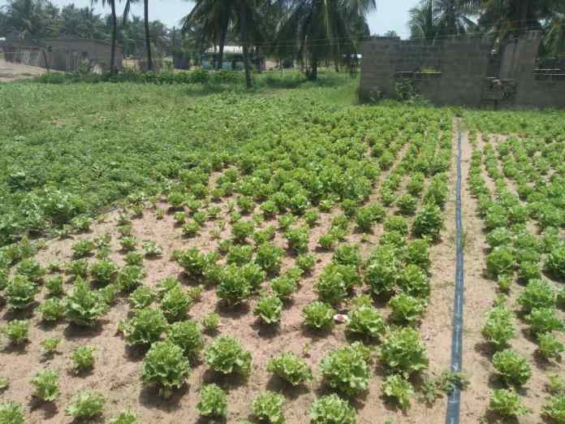Engineers at the Kwame Nkrumah University of Science and Technology (KNUST) are warning against consumption of vegetables grown along the Bibini River in Kumasi.
This is due to the detection of unsafe levels of heavy metals such as lead and cadmium and harmful bacteria.
The Bibini river is found within KNUST and is a tributary of Wiwi river.
It serves as a source of irrigation water for vegetables especially lettuce grown around the area.
Restaurants and food vendors in Kumasi and Accra purchase vegetables from farms along the Bibini river.
However, the river receives waste materials from a drain that has its content coming from a petroleum filling station, a car washing bay, gymnasium, hair salons, and greywater drains from adjoining hostels as well as drains from some KNUST engineering laboratories.
These activities result in the introduction of heavy metals and bacteria.
With time, these waste materials accumulate in agricultural soils and into food crops thus causing health problems.
The study therefore sought to find out the quality of the Bibini river used for irrigation and its impact on vegetable quality cultivated along the river.
The study published in the Journal of Environment & Ecosystem Science (EES) found the water from the river to be of low quality.
“The water quality indicators; dissolved oxygen, biochemical oxygen demand and water temperature were not within the recommended standards of Ghana’s Environmental Protection Agency,” lead investigator, Dr. Bennetta Koomson of the Department of Materials Engineering explained.
The research team also found that heavy metals including Cadmium, Lead and Chromium were present in the water, soil and vegetables.
Cadmium and lead found in vegetables were above the permissible limits.
Harmful bacteria were also found in the irrigation water as well as the lettuce.
“This makes them unsafe for human consumption as they can have adverse health implications on consumers.
“Microbial populations of faecal coliforms were found in the irrigation water as well as on vegetables produced beyond required levels indicating the vegetables produced are contaminated and of low quality hence can affect human life when consumed,” she said.
The team wants farmers to relocate to other areas to avert any future unfortunate events. “Farmers must be extensively educated and encouraged to relocate to other suitable farming land,” she advised.
Latest Stories
-
Ghanaian students gear up for Robotics World Championship
14 mins -
Political interference makes public sector managers appear incompetent – Dr Manteaw
20 mins -
Police arrest truck driver alleged to have caused train crash
24 mins -
CAF Confederation Cup: Dreams FC depart to Cairo ahead of semis first leg against Zamalek
28 mins -
Liverpool exit Europa League despite 1-0 win over Atalanta
34 mins -
Roma beat Milan to set up Bayer Leverkusen clash in Europa League semis
38 mins -
Mohammed Kudus’ West Ham suffer Europa League elimination
42 mins -
Madam Joyce Oparebea Mintah Addae
57 mins -
Fiscal deficits and debts to remain high over medium term – IMF
1 hour -
Kenyan military chief among 10 people killed in helicopter crash
2 hours -
Insinuating Bagbin is not heeding calls for recall because he is NDC unfounded and unfortunate – Parliament
3 hours -
Ashanti, Nelly are engaged and expecting a baby
4 hours -
New Ghana train on test run involved in accident
4 hours -
World Bank, AfDB partner to provide 300m African’s with electricity access
4 hours -
Ghana wins preliminary ruling in Cassius Mining’s $300m international arbitration
4 hours

